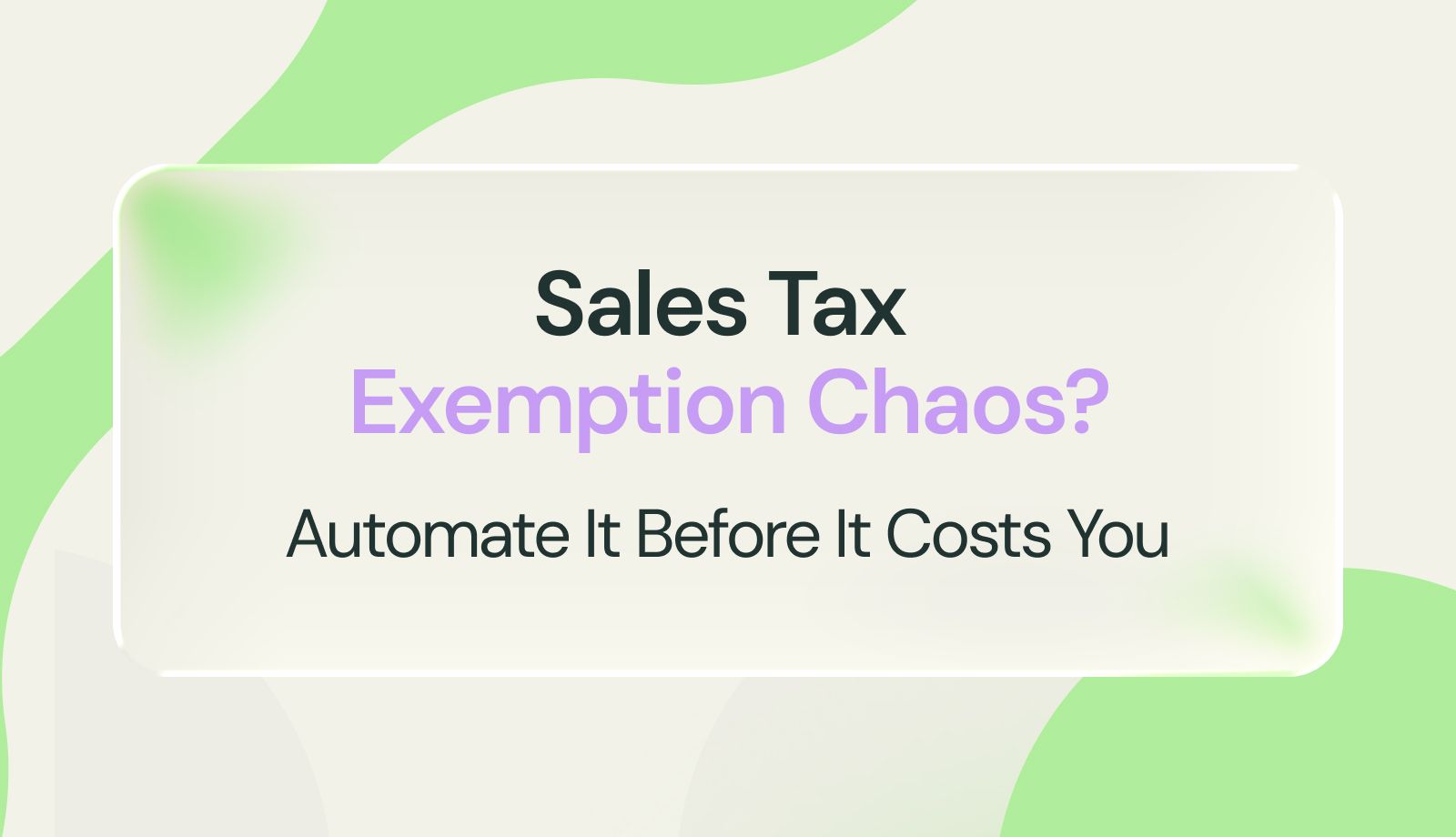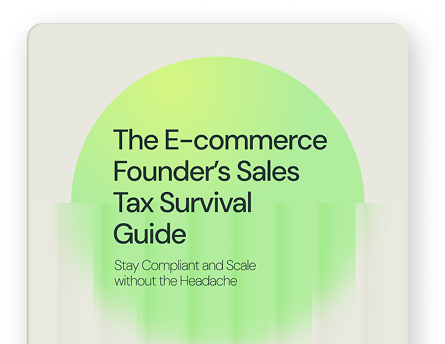Manage Sales Tax Exemptions with Ease: Best Practices for Ecommerce Sellers
03 September

Get a PDF of our ecommerce sales tax survival guide here
Ecommerce sellers deal with exemption requests from resellers, nonprofits, and B2B buyers. Manually handling them could lead to errors, but automation keeps you audit-ready.
Managing exemption certificates can be challenging for ecommerce businesses dealing with retailers and nonprofits. Since they sell tangible goods, usually taxable, a valid resale certificate or exemption certificate is required for an exempt transaction.
Keeping track of multiple buyer types and ensuring certificates are valid can be time-consuming. Worse, one missed detail can result in penalties or even trigger an audit. Good thing, automation is here to streamline the compliance process.
Understanding Sales Tax Exemptions in Online Retail
Sales tax exemption is a critical yet often overlooked challenge for online retailers. Ecommerce sellers frequently struggle with collecting and validating resale certificates across multiple states where they have sales tax obligations. This is evident as their sales tax nexus expands due to remote sales, inventory storage, or marketplace facilitator laws. Each new state requires separate registration, sales tax permits, and exemption validation. The complexity grows when third-party marketplaces handle fulfillment. It blurs the lines of who is responsible for compliance. Also, many retailers are unaware that third-party warehouse inventory can trigger nexus. The lack of the right system puts sellers at risk of over- or under-collecting tax. Thereby, exposing themselves to audits and penalties.
Key Requirements for Qualifying as Tax-Exempt
Not all buyers qualify for sales tax exemptions. For e-commerce sellers, misapplying them can lead to serious compliance risks. Thus, it is essential to understand the key requirements that govern exemption eligibility.
Valid exemption certificate: The buyer must provide a state-approved resale or exemption certificate. The document must be current, complete, and applicable to the transaction.
Verified customer status: The buyer must be a qualified entity (e.g., nonprofit, reseller, or government agency). Additionally, the purchases must meet the criteria for exemption in the relevant jurisdiction.
Applicable sales tax nexus: Sellers must determine whether they have a sales tax nexus in the buyer’s state before applying the exemption. If there's no economic nexus, tax collection may not be required.
Proper use of drop shipping rules: When drop shipping, sellers must understand the exemption rules across the supplier, seller, and buyer’s states. In some states, sellers must collect tax on drop shipments even if the buyer provides an exemption certificate—California being one example. Familiarizing yourself with drop shipping rules in each state keeps you from unintentionally skipping tax or misapplying exemptions.
Economic nexus consideration: Sellers exceeding economic nexus thresholds must verify exemption documentation for transactions within that state. Economic nexus varies per state, depending on its tax legislation. Most states use a $100,000 sales threshold, though some, like California and Texas, set it at $500,000. New York also sets its threshold at $500,000 and 100 or more transactions. A few states still enforce the 200-transaction threshold.
Physical presence exception: Exemption documentation is strictly enforced in states where the seller has physical presence. The document must be collected for every qualifying transaction.
Transaction-level validation: Exemptions must be applied only to eligible products or services. Misapplying an exemption to taxable items can result in under-collection and penalties.
Renewal and expiration tracking: Exemption certificates must be monitored regularly. As mentioned, while some don't expire, many do. Thus, periodic renewal is needed to keep the certificate valid for compliance.
The Cost of Poor Sales Tax Exemption Management for Ecommerce Businesses
Mismanaging exemption certificates can put a business at risk of a costly audit. A missing or invalid certificate could be interpreted as underreporting sales. Even if you make a legitimate exempt sale, without the proper documentation, the transaction is questionable.
The potential cost of poor sales tax exemption management includes:
1. Increased audit risk
Missing or invalid exemption certificates are one of the most noticeable red flags. Without proper documentation, ecommerce sellers may be flagged for under-collecting tax. This could lead to costly and time-consuming audits.
2. Penalties and interest
Without a valid certificate, there's no way to prove an exemption. Unfortunately, the seller and not the buyer becomes liable for the unpaid tax with added penalties and accrued interest. This makes the bill higher than the original tax owed.
3. Revenue loss from incorrect exemptions
Mishandling exemptions, like treating a taxable sale as exempt, is another pitfall. When you miss collecting tax where it is required, you'll have to pay it later. Hence, the business has to cut profits and face revenue loss.
4. Operational inefficiency
Many ecommerce founders spent hours on sales tax compliance when they started their business. The process includes manually collecting and validating exemption certificates. This reduced the time they could have spent on growing their business.
5. Damaged customer relationships
Without proper storage and innovative management, you could misplace or lose the sales tax certificates. While you can ask your customers for another copy, this could create friction, potentially hurting customer relationships. They could question your process and reputation in the competitive ecommerce space. Worse, this shortcoming could drive them to your competitors.
Poor management of exemption certificates is a serious issue. It's like walking through a minefield; one mistake costs you big. Imagine growing your business only to find out later that you didn't document the exempt sales. So, now you have to pay thousands of dollars for those transactions, including the penalties and interest. It eats into your profit and could lead you to lose some customers.
Best Practices to Collect and Validate Sales Tax Exemption Certificates
It's time to up your game when it comes to managing sales tax exemptions. Avoid the mistake above by following the best practices that will keep you audit-ready.
1. Collect certificates at the time of sale
Request exemption certificates during checkout or account setup. This helps avoid retroactive collection issues. Also, this ensures you have documentation tied to each exempt transaction before fulfillment. Waiting until later increases the risk of missing or invalid paperwork.
2. Validate certificate accuracy
When you receive the document, take time to check it. Ensure all required fields, such as tax ID numbers, signatures, dates, and exemption reasons, are complete. Tax authorities treat invalid or incomplete certificates as no certificates at all. Proper validation protects your business from being liable for unpaid taxes during audits.
3. Track expiration dates
Expiration rules differ widely—some states require yearly renewals, while others issue certificates without an expiration date. Set reminders or use automation to flag upcoming expirations. Doing this lets you inform your customers to renew before they place another order. This maintains compliance without last-minute scrambling.
4. Validate against state rules
States have different tax laws regarding the validity of sales tax exemptions. So, you may need to deal with various forms and expiry dates when selling in multiple states. So, cross-check each certificate against the relevant state's guidance to confirm validity. You may request the state-specific form or additional documentation to avoid reclassification.
5. Link certificates to transactions
Each approved certificate should be linked to a customer profile and applied to qualifying orders only. Make sure to evaluate product taxability and exemption scope, so you don't over-exempt. For instance, a nonprofit purchased 10 laptops for their organization and five headsets for personal use. The laptop qualifies for an exemption, but not the headsets. So, link certificates to transactions to justify the exemption. This will be very helpful, especially during audits.
6. Audit your certificate database regularly
Make it a habit to audit your certificate database to catch expired forms, incomplete certificates, or misuse of exemptions. Reconcile exempt sales totals with your valid certificate list. Internal reviews keep you in control of the process and help avoid triggering an audit.
Never lose track of an exemption certificate again, let Kintsugi keep you audit-ready
How Automation Simplifies Sales Tax Exemption Management for Ecommerce
Manual management of exemption certificates is error-prone and time-consuming. The work multiplies when you deal with multiple states and diverse buyers. However, you do not have to go through with it and wait for a slip-up.
Automation is here to streamline the process. It ensures certificates are collected, validated, and stored. Sales tax automation software keeps your business audit-ready with minimal effort.
Sales tax automation streamlines the process by:
Automating collection and validation
Automation tools collect exemption certificates digitally during checkout or onboarding. It also validates key fields like tax ID, expiration date, and exemption type. This reduces the risk of errors or invalid documentation slipping through.
Centralized digital storage
All certificates are stored in a secure, centralized dashboard linked to customer profiles. This makes retrieval during audits simple. Most importantly, it eliminates the hassle of paper-based or scattered storage.
Renewal tracking and alerts
Automated systems monitor expiration dates and send alerts when a certificate nears renewal. This ensures exemptions remain valid and prevents accidental tax liability from expired certificates.
Integration with sales channels
Automation connects directly to your ecommerce platforms like Shopify or Amazon and applies real-time exemptions. This ensures the correct tax treatment is applied at checkout without manual SKU mapping or overrides.
Streamlining Exemption Certificate Management with Kintsugi
Kintsugi helps online sellers stay audit-ready by organizing every exemption and resale certificate securely. It also automatically links exemption certificates to the correct customer record and transaction for guaranteed compliance. With Kintsugi, everything is digitized, searchable, and accessible in seconds.
The platform also tracks expiration dates and sends timely alerts. You'll never miss a renewal and risk losing a valid exemption. This saves hours of manual work and prevents costly and unnecessary penalties. Kintsugi offers your business the confidence to grow without compliance worries. Book a demo to see how Kintsugi works.

Catherine Armecin Martin
Cath is a content writer for marketing at Kintsugi. She graduated with a degree in Computer Science at the University of the Philippines Cebu. Her passion for writing paved the way for a career shift from writing codes to copywriting. She also writes web content and news articles. She has contributed to several online media publishing, including International Business Times, The List, and Game Rant. Cath is an avid reader and writer committed to continuous learning and personal growth. She views herself as a work in progress, always open to new insights and experiences. Passionate about sharing knowledge, she strives to inform, inspire, and contribute positively to those around her.
Ready to automate
your sales tax?
2261 Market St,
Suite 5931
San Francisco, CA 94114
Resources
US State Sales Tax GuidesCanada Province Sales Tax GuidesUS City Sales Tax GuidesSecurity & PrivacyBlogAPI ReferenceKintsugi Status2261 Market St,
Suite 5931
San Francisco, CA 94114


